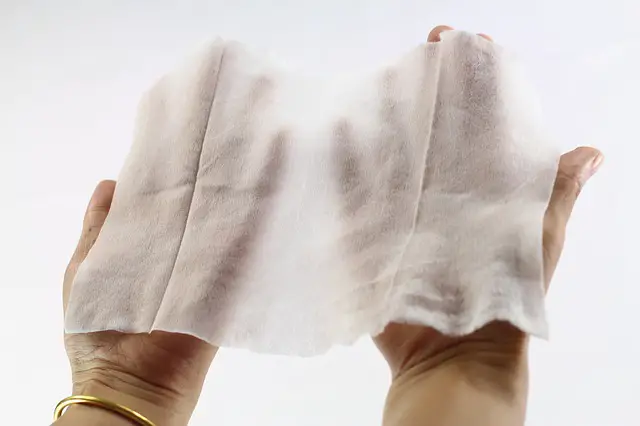The use of wet wipes may have a range of potential issues.
In this guide, we discuss how eco friendly and sustainable wet wipes like general wipes, baby wipes, and make up remover wipes might be.
Summary – Are Wet Wipes Eco Friendly & Sustainable
There’s a few different types of wet wipes.
There are regular wet wipes (usually made with synthetic fibres like plastic, and synthetic chemicals), and there are the newer more natural wet wipes (made with natural fibres, and some natural substances)
Even though the newer more natural wet wipes from some companies offer many more eco friendly improvements in terms of being made with natural fibres, and having natural cleaning and disinfectant chemicals (compared to synthetic), there are probably still questions over how biodegradable, compostable and flushable (and dissolvable in water and sewage pipes) they really are
Because of these concerns, as a whole, wet wipes probably fall behind reusable and washable flannel cloths, 100% post consumer recycled toilet and tissue paper, bamboo tissue and toilet paper, regular toilet and tissue paper, and bidets in terms of eco friendliness and sustainability.
*Ultimately, how eco friendly and sustainable wet wipes are depends on the specific brand and product (we don’t want to put brands all brands in the same category when some offer far more benefits than others).
Some are better than others, but, there’s still general trends with wet wipes that are observed as a whole.
Also, note the general consideration that has to be made between landfill, recycling, incineration and composting of different wastes, and which waste management method might be best.
What Wet Wipes Are Used For
For general cleaning and sanitising of the body
To clean body parts after going to the toilet
As baby wipes
Removal of make up (an eco friendly alternative is a reusable and washable organic cotton flannel or cloth, or recycled or bamboo tissue paper, with some makeup remover solution, coconut oil or vaseline on it)
Specifically for feminine hygiene
+ other uses
Wet Wipes – Eco Friendliness & Sustainability
Regular wet wipes are usually made of plastic or synthetic fibres, contain synthetic cleaning, disinfectant and fragrance chemicals, may or may not be biodegradable and compostable, and may or may not dissolve in a toilet
Some of the newer wet wipes can be made of natural fibres, contain natural cleaning, disinfectant and fragrance chemicals, might meet biodegradability and compostability standards (but, these standards might only be applicable to certain disposal conditions, or still take a long time to break down in nature), and may or may not actually be suitable to flush and dissolve in water
So, wet wipes have inconsistencies among mody manufacturers – some manufacturers try to make their product more eco friendly and sustainable than others
For disposal, wet wipes can be thrown away where they usually end up in landfill, or some people flush them.
Both are problematic.
Wet wipes have been identified as a major cause of pipe blockages, and consequently cost a lot of money to remove.
That money could go to upgrading pipes instead.
Wet wipes have also been linked to water and land pollution (via synthetic chemicals contained in them), as well as causing problems for wildlife that might ingest smaller broken down bits of them
A Caution On ‘Natural’ Wet Wipes When Is Comes To Sustainability
‘Natural’ and ‘Organic’ wet wipes sound great – but don’t look at the words used on the labels and in the marketing and ask no further questions.
Check exactly what each of these words means, exactly how the product is made, what it is made of, and how it performs and breaks down.
Some things to be aware of might be:
– Made Of Natural Fibres
What % is natural fibres? Where are the fibres grown and sourced from? Any statement on how eco friendly or sustainable this process is, or does it meet certifications?
– Made With Natural Cleaners and Disinfectants & Fragrances
What natural/organic chemicals exactly? Do they list them individually?
– Advertised As Compostable Or Biodegradable
Check the what the actual standards of compostable and biodegradable are in your country (according to regulations or guidelines for consumer products).
A product might only be compostable or biodegradable under certain conditions that landfills or other disposal methods can’t offer.
If these conditions aren’t provided, the wipes may take as long to break down as other non natural and synthetic materials.
– Advertised As Flushable/Dissolvable
Many wipes have this claim, but in reality, get stuck in pipes and create blockages, or get through to the sewage treatment facility and aren’t fully broken down.
Check what dissolvability tests they have actually passed, and whether they have been approved by an official/governing water or sewage/waste authority in your country or state.
Usually toilet paper has no issue dissolving, but wet wipes have issues.
Wet Wipes vs Toilet Paper vs Bidets – Which Are The Most Eco Friendly & Sustainable?
100% recycled post consumer tissue and toilet paper, and bamboo tissue and toilet paper probably rank first in terms of sustainability and eco friendliness, with bidets on a similar level
Regular toilet paper (that uses harvested and pulpwood forest wood) probably comes second
Whilst wet wipes are probably the worst (as of right now) from an eco and sustainability perspective
Read more about toilet paper vs bidets vs wet wipes in this comparison guide
Sources
1. https://www.abc.net.au/news/2015-03-19/wet-wipes-clog-sewerage-pipes-costly-to-remove/6330652
2. https://www.smh.com.au/national/nsw/sydney-water-threatens-legal-action-as-wipes-block-drains-20160304-gnax4u.html
3. https://www.bbc.com/news/uk-46188354
4. Various synthetic and natural wet wipe company product detail pages
5. Various BMR toilet product guides
','' ); } ?>